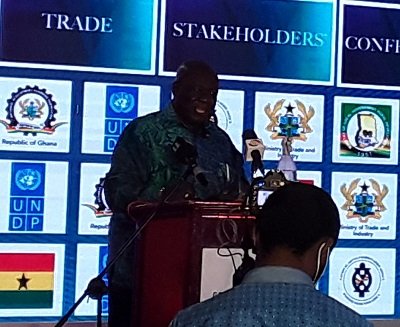National Development Planning Commission (NDPC) has developed a system for measuring the performance of Metropolitan, Municipal and District Assemblies (MMDAs) in their efforts to take advantage of the African Continental Free Trade Agreement (AfCFTA).
Dubbed, “District Development Indicators”, the measuring would include the preparedness of the MMDAs to support the private sectors and their preparedness to enhance production capacities of their people toward benefiting from the AfCFTA.
Dr Kodjo Essiem Mensah-Abrampa, Director-General of the NDPC, who dropped the hint, indicated that there would be District League Table that would be published every half year of the performance level of the districts within their regions.
Speaking at a day’s stakeholders’ conference here on Wednesday, Dr Mensah-Abrampa observed that there was the need for the MMDAs to look for their comparative and competitive advantages to be able to benefit from the free trade.
Under the theme, “Unlocking the potentials of local authorities to harness the benefits of AfCFTA”, the conference sought to deliberate on how the MMDAs could take advantage of the AfCFTA.
It was also to identify bottlenecks that impeded their participation in the regional trade agreement and to elicit views on the integration process.
Dr Mensah-Abrampa asked the MMDAs to do all possible to provide basic amenities such as water, good drains and adequate waste management in their various districts to be able to attract investments under the AfCFTA.
He said to attract investments and sustain them “there is the need to provide an environment convenient for people to function and produce quality goods that look beyond Ghana”.
According to the Director-General, NDPC was prepared to support MMDAs to put in place all that was needed to take advantage of the continental free trade as he reiterated the call on them to look within their districts to bring out the best and attract investments.
Dr Fareed Arthur, Head, Ghana AfCFTA Coordinating Office, touched on how Ghana had initiated processes, including national level conversations and strategy formulation on the opportunities the continental free trade could offer and how Ghanaian manufacturing companies, and exporters could take full advantage to reach the larger African market.
Out of the 54 countries that had signed to the continental trade, 39 of them had ratified the agreement, implying they were ready to do business with their counterparts.
He said the basic idea of the AfCFTA was to remove all barriers and create one common market and transform Africa into a small economy, adding that tariffs had been removed by some countries such as the Seychelles, Mauritius, while Ghana and others were also phasing out theirs.
Dr Arthur urged the MMDAs to identify what they could produce and rebuild their capacities to reap the benefits from the free trade, stressing that the “building block is at the district level with the small medium enterprises being key to the AfCFTA”.
Participants included entrepreneurs, staff from MMDAs and a section of the public.
FROM KINGSLEY E.HOPE, KUMASI

